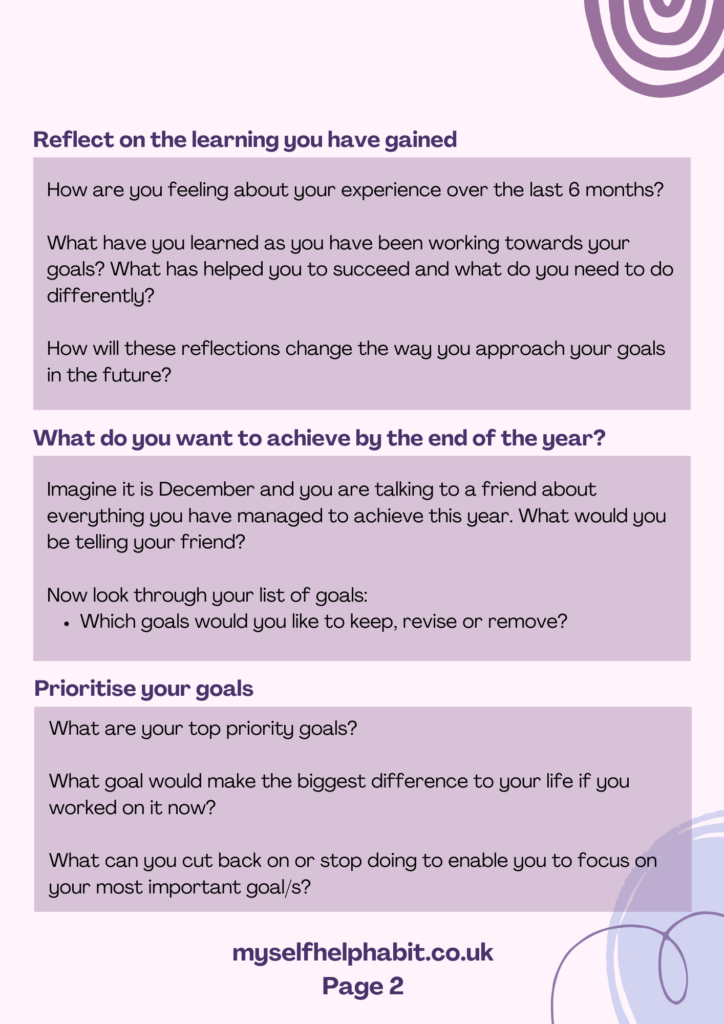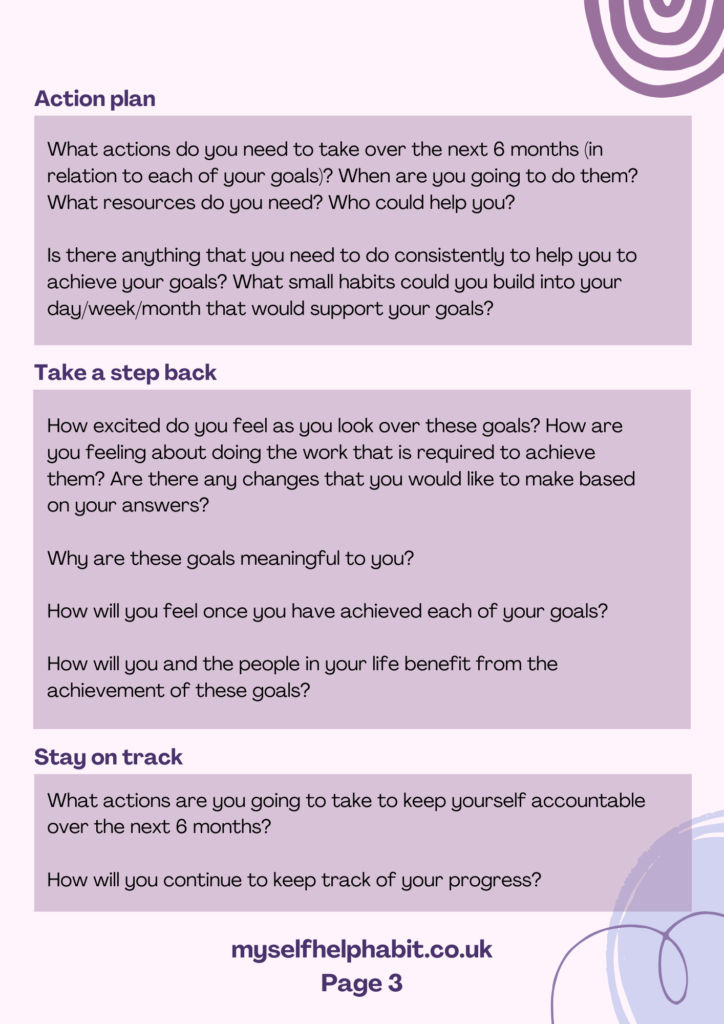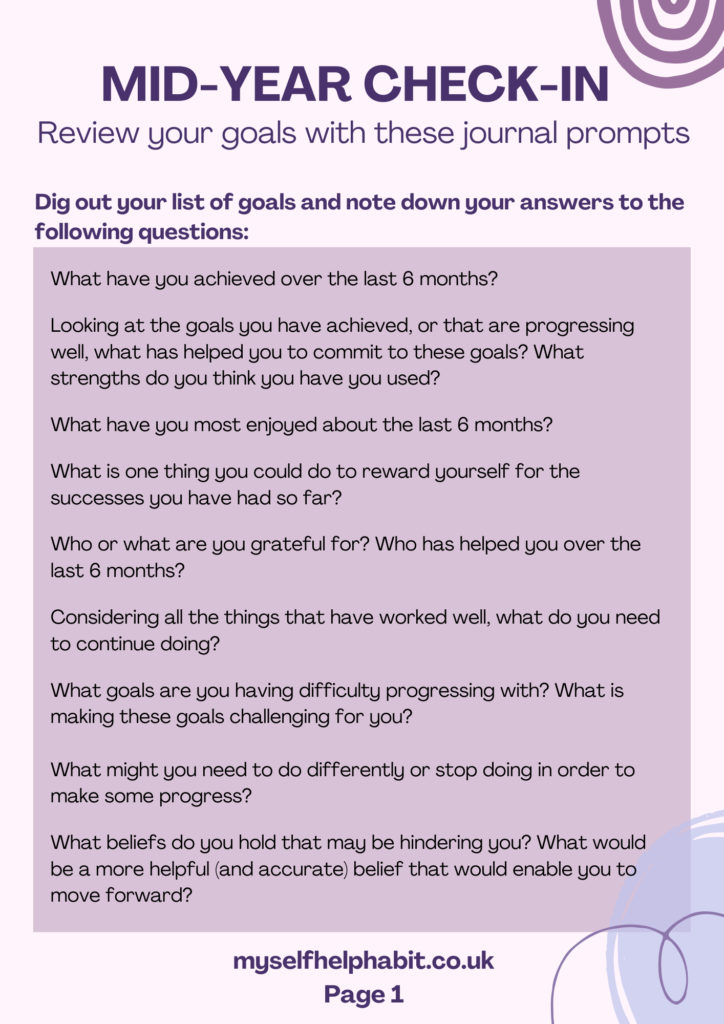
Time for your mid-year check-in! How to review your goals and keep yourself on track
Remember those goals that you set back in January when you were full of that ‘New Year, New You’ enthusiasm? Well, hopefully you do!
How are you doing now that we are six months into the year?
Taking the time to do a mid-year review of your goals will give you a chance to check that whatever you are working towards is still relevant and right for you.
Even though you might really want to make some changes in your life it is so easy to get distracted and completely sidetracked. If you have lost track of your ‘why’ then reviewing your goals will remind you of the reason you set out to achieve them (which can give you the impetus to continue!)
On a practical level, reviewing your goals on a regular basis will help you to keep them in mind and lets you know whether or not you are on course to accomplish them. It also helps you to maintain your progress since you will be able to identify where you need to make changes so that you can move forward and achieve your goals.
In this post I will share a step by step process that you can use to review your goals now that we are half-way through the year. You can also download some journal prompts by clicking on the image below if you would like engage in some deeper reflection at each stage of the review process.


1. Set the scene for your mid-year review
Treat this as some precious time to reconnect with yourself and the kind of future that you desire. Find a slot in your calendar when you are unlikely to be interrupted so that you can dedicate your time to reflecting on your progress so far.
There is no set time for a mid-year review but, from experience, I would say block out at least an hour in your diary. Get out your notebook and pen so that you can write down your thoughts and ideas. You may also want to have your favourite drink and a delicious snack to hand! Then do whatever it is that you need to do to get yourself centred and into a positive mindset (e.g. breathing techniques, mindfulness exercises, listening to upbeat music, thinking about what you are grateful for and all the things that have gone well recently).
2. What are your goals?
Hopefully your goals are top of mind but if not then dig them out of your notebook or wherever it is that you have recorded them.
If you haven’t recorded your goals anywhere then take the opportunity to write them down now (as this makes it more likely that you will achieve your goals).
3. Take stock
This is the time to take a good honest look at where you are now and how you are feeling about the progress you have made towards your goals.
Go through each of your goals and note down:
The successes you have had over the last 6 months – Looking at what has gone well will give you a chance to recognise and celebrate your progress. This can give you a confidence boost and the motivation to keep going.
It is also important to acknowledge what is going right since you can learn from these things too! By identifying your strengths and preferred ways of working you can see what what works well for you and what you need to continue doing.
The challenges you have faced – As well as noting your achievements over the last six months, you will also need to look at what has not gone well and what you are struggling to make progress on.
Try to identify what has hindered you and how you can overcome such obstacles.
Here are some things that can scupper your progress:
- Not taking action on your goals – This is where you need to dig a little deeper to discover why you are not taking action. What is really getting in your way? You may need to explore whether you are holding onto any limiting beliefs or habits that no longer serve you.
- The goal is not specific enough – If the wording is vague then you might not remember what you meant when you created the goal and what you were aiming for. It is good to ask yourself: How will I know when I have achieved this goal (or how will others know)?
- The goal is too much of a leap – It may just be a matter of seeing how you can break the goal down into smaller steps if it appears to be too ‘big’.
- You don’t want the goal any more (or you don’t want it enough!) – You may need to consider how serious are you about achieving the goal and contemplate just how important is it to you right now.
- It is not your goal – you made it because it is something you think you ‘should’ be doing and perhaps you have been influenced by someone else in your life.
- You have forgotten why you wanted the goal in the first place (e.g. the problem or desire it was addressing) or there is currently no incentive for you to achieve it. You therefore need to consider what would motivate you to achieve it.
- You have become too distracted by other things in your life – you will need to identify what is distracting you and look at how you can minimise, manage or remove the distractions.
- You have too many goals – you are not making much progress as you are trying to do everything at once.
- Unrealistic timescales – these are tricky to estimate and sometimes things just take longer that we think!
- You don’t have the knowledge or resources that you need – you therefore have to work out how you are going to find out the information and obtain the resources you need.
- Your approach to the goal is not working well and you need to consider other strategies that suit you better.
Note: Please be kind to yourself when you are assessing what has not gone well. It can feel frustrating when you are not where you want to be and something is not quite working out as you initially expected but make this part of the review process a ‘Be Kind to Yourself’ zone. You probably did lots of other things instead and may have had a really good reason to put your focus elsewhere. As much as you might want to turn back the clock, you can only go forwards and beating yourself up really doesn’t help!
Just focus on what you have learned from the experience and what you need to do to move ahead, which takes us to the next step…
4. Reflect upon the learning you have gained
From your reflections above, summarise what you have learned about yourself and your way of working towards the goals you have set.
Think about how you are feeling about your experience over the last six months and what has helped you to succeed as well as what you need to do differently. You can use these insights to change your approach to your goals.
5. Decide which goals you want to keep, revise or remove
Think about what you want to achieve by the end of this year. Now take a good look through your list of goals to ensure that they are all still relevant and that you really want to achieve them.
You may decide to:
- Keep the goals exactly as they are
- Revise some or all of the goals – Perhaps you have decided to go in a new direction and need to create a different goal or maybe you just need to make some minor changes to the wording, deadlines or targets?
- Remove them if they are no longer relevant (or put them to one side while you work on more important things).
6. Prioritise and break down your goals
It can be tempting to create a whole list of things that you really want to achieve and that you would like to work on simultaneously. However, this can quickly lead to overwhelm and be very demotivating when you don’t progress as far as you would like because you are trying to juggle too many things.
You can avoid this by asking yourself:
- Which goals are most important to me?
- What goal would have the most positive impact on my life if I achieved it?
You will also need to consider your existing personal and professional commitments and what you can realistically work on over the next six months.
You can then decide which goal/s need to be your primary focus and what can be kept for another time. I would recommend having no more than three primary goals.
Next, you need to figure out how you are going to get what you want (if you haven’t already got some actions written down).
Underneath each goal, note or highlight all the actions that you will need to take over the next six months. Be as specific as possible and think about all the steps involved (the smaller the steps the better!) Decide what needs to happen first and then assign some deadlines to your actions. Think about how much time you will need in order to avoid putting yourself under too much pressure (don’t be afraid to over estimate timings!) and identify any resources or support you will need to enable you to carry out your actions.
Also, think about the small daily, weekly or monthly habits that could support your goals. I schedule monthly actions into my calendar so that I don’t forget to do them and I put any daily habits onto the habit tracker that is printed in my weekly planner until they are well established (i.e. they become so automatic that I don’t need any reminders to carry them out!)
7. Take a step back
Once you have all of your goals for the next six months listed out, take a moment to look over them to gauge how you feel. If they are aligned with the future you want to create, fill you with excitement and you are raring to go then great! They may even make your stomach flip if they are a bit of a stretch out of your comfort zone.
However, if they feel too daunting (or dull or onerous!) then you may need to revisit the previous steps and make a few changes.
To add an extra spring in your step as you move towards your goals, it is also worth noting down:
- How you will feel when you have achieved each of your goals
- Why these goals are so meaningful to you
- How each goal benefits you and other people in your life
Finally, consider the actions that you need to take to keep yourself accountable over the next six months. This could mean sharing your progress with a supportive friend or group, hiring a coach to work through any obstacles and to review your progress, and scheduling weekly check-ins with yourself in order to reflect on your successes and challenges.
8. Continue to keep track of your goals
By reminding yourself of your goals, and keeping them in sight, you will be able to make daily decisions and actions that are in alignment with them. This, in turn, will ensure that you stay committed to your goals. So, have a think about how you could keep your goals in mind and regularly track the progress that you are making towards them.
I have tried many different ways of doing this over the years and it can take a while to find a method that suits you. I used to have all my goals and sub-actions listed on a colourful but complicated spreadsheet that soon became too onerous to keep updated! I have just gone back to a Word document which I update at least every month with the goals as my headings and the sub-actions listed underneath. I then cross off the completed actions and add in new ones when appropriate. I also use this document to plan out my week and any actions that I want to do get scheduled into my planner.
As I hope these steps have shown, a six-monthly review of your goals will enable you to take a step back from your daily activities and check-in with how things are going. It provides you with the opportunity to reflect on whether or not you are heading in the right direction and allows you to spot the changes that you need to make so that you can keep moving towards the life you really want.





